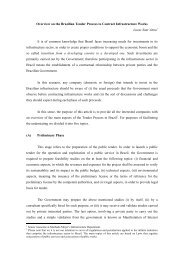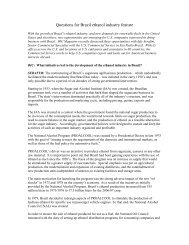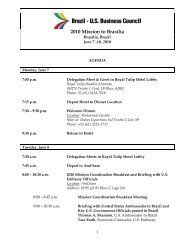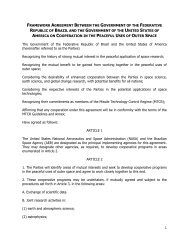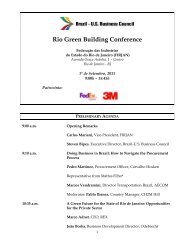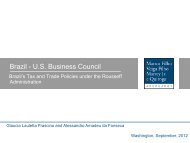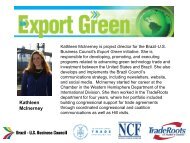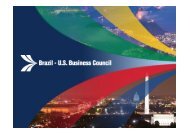U.S. Chamber of Commerce - Coalition for Sugar Reform
U.S. Chamber of Commerce - Coalition for Sugar Reform
U.S. Chamber of Commerce - Coalition for Sugar Reform
Create successful ePaper yourself
Turn your PDF publications into a flip-book with our unique Google optimized e-Paper software.
CHAMBER OF COMMERCEOF THEUNITED STATES OF AMERICAR. BRUCE JOSTENEXECUTIVE VICE PRESIDENTGOVERNMENT AFFAIRS1615 H STREET, N.W.WASHINGTON, D.C. 20062-2000202/463-5310July 10, 2012The Honorable Frank LucasThe Honorable Collin PetersonChairmanRanking MemberCommittee on AgricultureCommittee on AgricultureU.S. House <strong>of</strong> RepresentativesU.S. House <strong>of</strong> RepresentativesWashington, DC 20515 Washington, DC 20515Dear Chairman Lucas and Ranking Member Peterson:As the House Committee on Agriculture prepares to consider the House version <strong>of</strong> the2012 Farm Bill, the U.S. <strong>Chamber</strong> <strong>of</strong> <strong>Commerce</strong>, the world’s largest business federationrepresenting the interests <strong>of</strong> more than three million businesses and organizations <strong>of</strong> every size,sector, and region, strongly supports an amendment expected to be <strong>of</strong>fered by Rep. Goodlattewhich would re<strong>for</strong>m the sugar program; and strongly urges the Committee to seize thisopportunity to secure a definitive solution to the U.S.-Brazil World Trade Organization (WTO)cotton case.The Goodlatte Amendment would bring several needed re<strong>for</strong>ms to the U.S. sugarprogram, a chronically flawed policy that creates and maintains an artificial gap between U.S.and world sugar prices. According to the U.S. Department <strong>of</strong> Agriculture, the price <strong>of</strong> U.S. rawsugar in March was 40 percent higher than the world price <strong>of</strong> raw sugar. While the sugarprogram is <strong>of</strong>ten described as a “no-net cost” program, it in fact imposes major costs. Accordingto the U.S. Department <strong>of</strong> <strong>Commerce</strong>, <strong>for</strong> every one sugar-growing job protected, threemanufacturing jobs are lost. The program costs consumers as much as $3.5 billion a year.Further, high U.S. sugar prices have led manufacturing jobs to move abroad, and traderestrictions have thwarted our leverage in Trans-Pacific Partnership market-access negotiations.This sugar re<strong>for</strong>m amendment would not end the sugar program, but would provide farreachingand pragmatic re<strong>for</strong>ms. In the 2008 Farm Bill, Congress exacerbated an already anticompetitiveprogram by, among other things, increasing price supports and introducing theFeedstock Flexibility Program, in which the federal government purchases surplus sugar andsells it at a loss to ethanol plants. This amendment would remove those damaging add-ons.Moreover, it would establish market-oriented components to help spur job creation and ease theprogram’s burden on manufacturers.In addition, the <strong>Chamber</strong> urges that the legislation provide a definitive solution to theU.S.-Brazil World Trade Organization (WTO) cotton case in the 2012 Farm Bill. However, theversion <strong>of</strong> the 2012 Farm Bill the Committee is expected to consider would roll back keyprovisions <strong>of</strong> the Senate-approved 2012 Farm Bill, increasing the risk <strong>of</strong> WTO-sanctioned traderetaliation against the United States by Brazil.
The Farm Bill is the proper vehicle to re<strong>for</strong>m the agricultural export-promotion andsafety-net programs that currently violate WTO rules. Failure to make these re<strong>for</strong>ms could resultin hundreds <strong>of</strong> millions <strong>of</strong> dollars in Brazilian trade retaliation against U.S. goods – includingagricultural products such as dairy, fruit, and wheat – as well as against U.S. intellectual propertyrights. These sanctions could lead to the loss <strong>of</strong> thousands <strong>of</strong> American jobs.The <strong>Chamber</strong> supports the provision in the House version to eliminate Counter-CyclicalPayments (CCP), but urges you to further re<strong>for</strong>m Marketing Loan Payments (MLP), including byreducing the proposed $0.47 per pound to $0.52 per pound loan rate band <strong>for</strong> cotton.The <strong>Chamber</strong> also urges the Committee to pursue the following changes: 1) eliminate theproposed trade-distorting $0.6861 per pound reference price <strong>for</strong> the Stacked Income ProtectionPlan <strong>for</strong> Producers <strong>of</strong> Upland Cotton (STAX); 2) set the STAX protection factor at no more than120 percent; and 3) establish a $4.5 billion cap <strong>for</strong> the GSM-102 export credit guaranteeprogram. These changes are necessary to bring the current draft in alignment with the Senatepassed2012 Farm Bill and with U.S. international obligations.Finally, the <strong>Chamber</strong> urges the Committee to retain provisions <strong>of</strong> the current draftdirecting the Office <strong>of</strong> the U.S. Trade Representative and the U.S. Department <strong>of</strong> Agriculture tonegotiate an agreement with the Government <strong>of</strong> Brazil to permanently adjust GSM-102provisions, in particular length <strong>of</strong> tenors, amount <strong>of</strong> disbursements, and fees required to cover thecost <strong>of</strong> the program, in order to secure a definitive solution to the WTO dispute. Doing so isvital as the GSM-102 program represents the bulk <strong>of</strong> Brazil’s trade retaliations rights.While there may be differences between the United States and Brazil with regard to theproper amount <strong>of</strong> retaliation authorized by the WTO, failure to address these issues in the FarmBill risks both direct retaliation and “cross-retaliation” against U.S. goods and intellectualproperty rights. The burden will be on the United States to prove compliance with WTO ruleswhen and if Brazil proceeds with its WTO-sanctioned retaliation. While these rules require amaximum five-month period <strong>for</strong> such an analysis, current practice in Geneva and thecomplexities <strong>of</strong> the cotton dispute will likely extend this period much longer. In a previous,precedent-setting stage <strong>of</strong> the dispute, the WTO took nearly two years to analyze a claim <strong>of</strong> U.S.compliance with its rules be<strong>for</strong>e rejecting it. Any such scenario could result in lasting andsubstantial damage to U.S. farmers, businesses, and innovators.The <strong>Chamber</strong> urges the Committee to vote in favor <strong>of</strong> the Goodlatte Amendment, whichwould bring needed re<strong>for</strong>m to the U.S. sugar program. The <strong>Chamber</strong> also strongly urges theCommittee to support American exports, jobs, and innovation by securing a definitive solution tothe U.S.-Brazil World Trade Organization cotton case when you consider the House version <strong>of</strong>the 2012 Farm Bill.Sincerely,R. Bruce Jostencc: The Members <strong>of</strong> the House Committee on Agriculture



